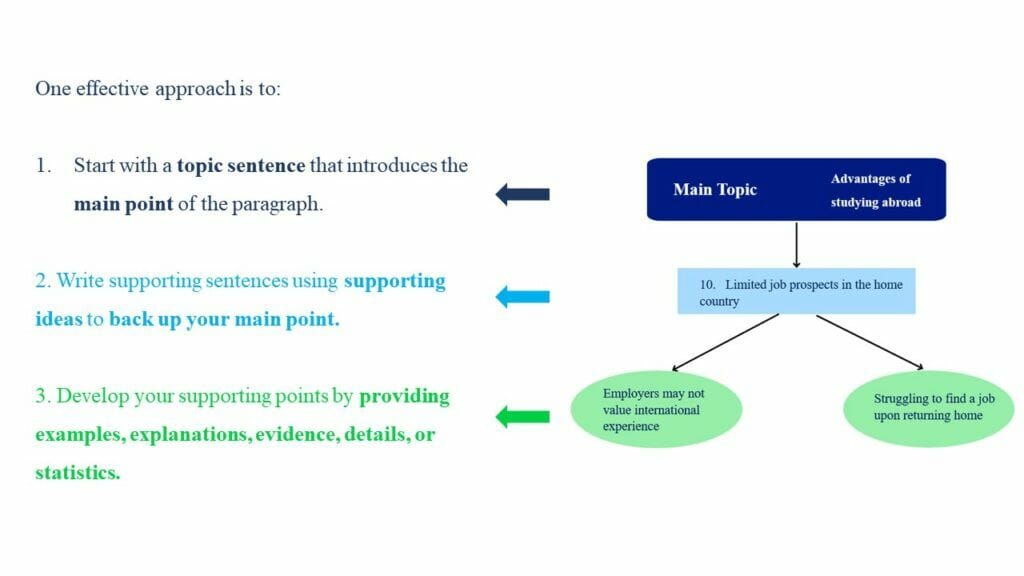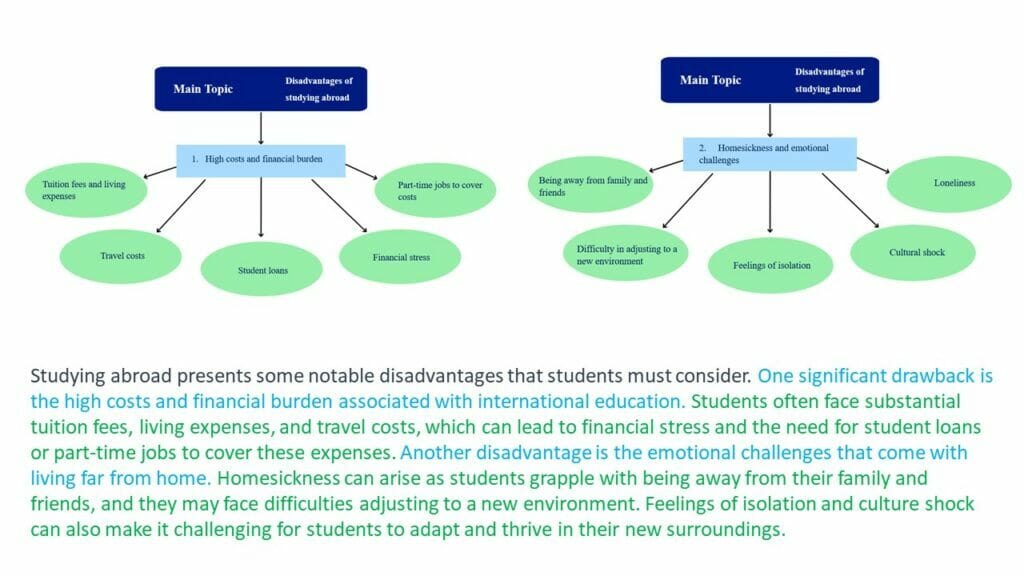In today’s post, we’re going to practice brainstorming for writing academic essays. Our focus will be on studying abroad, a popular and engaging topic that many students can relate to.
To help you master the art of brainstorming, we’ll explore the advantages and disadvantages of studying abroad, generating ideas that will serve as the foundation for a well-rounded, balanced essay.
So, if you’re ready to elevate your brainstorming skills and dive into the world of studying abroad, let’s get started!”
If you prefer to read a blog post instead of watching a video, read the following article:
Let’s begin with the advantages of studying abroad
1. Exposure to new cultures and perspectives
• Develops adaptability and open-mindedness.
• Interaction with locals.
• Immersion in a foreign language
• Understanding diverse customs.
• Enhances cultural awareness and sensitivity.
2. Improved career prospects.
• Valuable international experience.
• Networking opportunities.
• Global job market.
• Enhanced language skills.
• Multinational companies value international education.
3. Personal growth and development.
• Increased independence and self-reliance.
• Problem-solving and critical-thinking skills.
• Building resilience and coping strategies.
• Time management and organizational skills.
4. Access to higher quality education and resources.
• Prestigious universities and specialized programs.
• Renowned professors and researchers.
• Advanced facilities and learning environments.
• Opportunities for internships and research.
5. Expanding social circles and making lifelong friends.
• Meeting diverse people from around the world.
• Building international friendships.
• Gaining a support network of fellow students.
6. Travel opportunities and exploration.
• Discovering new places and experiences.
• Developing a sense of adventure and curiosity.
• Appreciating natural beauty and historical landmarks.
7. Broadening global perspectives and understanding.
• Enhancing global citizenship.
• Promoting tolerance and empathy.
• Encouraging cross-cultural communication.
8. Developing leadership and communication skills.
• Navigating in unfamiliar situations.
• Collaborating with people from different backgrounds.
• Effective communication in diverse settings.
9. Scholarship and financial aid opportunities.
• Access to scholarships for international students.
• Financial aid and grants from universities or organizations.
10. Boosting self-confidence and personal achievements.
• Overcoming challenges and celebrating successes.
• Building a sense of accomplishment and pride.
These are just some of the numerous advantages that studying abroad can offer.
Now, let’s focus on the disadvantages of going abroad
1. High costs and financial burden.
• Tuition fees.
• Living expenses.
• Travel costs.
• Student loans.
• Financial stress.
• Part-time jobs to cover costs.
2. Homesickness and emotional challenges.
• Being away from family and friends.
• Difficulty in adjusting to a new environment.
• Feelings of isolation.
• Cultural shock.
• Loneliness.
3. Language barriers and communication difficulties.
• Struggling with a new language.
• Misunderstandings and miscommunication.
• Difficulty in expressing oneself or understanding others.
4. Academic challenges.
• Different educational systems and teaching styles.
• Adapting to a new curriculum.
• Difficulty in transferring credits or obtaining degree recognition.
5. Health and safety concerns.
• Access to healthcare and insurance.
• Mental health challenges due to stress and adjustment.
• The potential risk of crime or political instability in certain regions.
6. Limited support network.
• Lack of familiar support system.
• Difficulty in finding help or guidance.
7. Visa and bureaucratic issues.
• Obtaining and maintaining a student visa.
• Dealing with immigration policies and paperwork.
8. Struggles with time management and responsibilities.
• Balancing academic workload, social life, and self-care.
• Managing daily tasks and chores without family support.
9. Potential discrimination or cultural insensitivity.
• Facing prejudice or stereotypes.
• Difficulty in adapting to local customs and norms.
10. Limited job prospects in the home country.
• Employers may not value international experience.
These are some of the potential disadvantages of studying abroad.
A helpful structure for writing body paragraphs
Now, we will discuss a helpful structure for writing body paragraphs in your academic essays for exams like IELTS and TOEFL. One effective approach is to:
1. Start with a topic sentence that introduces the main point of the paragraph.
2. Write supporting sentences using supporting ideas to back up your main point.
3. Develop your supporting points by providing examples, explanations, evidence, details, or statistics.

Now, let’s apply this structure to out today’s topic: the advantages and disadvantages of studying abroad.
Let’s choose a few of the ideas we generated and write a good body paragraph.
Let’s begin with the advantages of studying abroad.
Here are some of the previously generated ideas:

Studying abroad offers numerous advantages that can significantly enhance a student’s personal and professional life. One of the most impactful benefits is the exposure to new cultures and perspectives. By interacting with locals, immersing themselves in a foreign language, and understanding diverse customs, students develop adaptability, open-mindedness, and cultural sensitivity. These qualities are highly valued in today’s globalized society. Another major advantage of studying abroad is the improvement in career prospects. Students gain access to networking opportunities, the global job market, and the chance to work for multinational companies that appreciate the value of international education.
Now, Let’s focus on the disadvantages of studying abroad.
Here are some of the previously generated ideas.

Studying abroad presents some notable disadvantages that students must consider. One significant drawback is the high costs and financial burden associated with international education. Students often face substantial tuition fees, living expenses, and travel costs, which can lead to financial stress and the need for student loans or part-time jobs to cover these expenses. Another disadvantage is the emotional challenges that come with living far from home. Homesickness can arise as students grapple with being away from their family and friends, and they may face difficulties adjusting to a new environment. Feelings of isolation and culture shock can also make it challenging for students to adapt and thrive in their new surroundings.
And there you have it! We’ve covered the process of brainstorming for academic essays, focusing on the advantages and disadvantages of studying abroad. With these ideas in mind, you’re now better equipped to approach your essay writing with confidence and creativity.
Remember, practice makes perfect, so continue to hone your brainstorming skills on various topics. If you found this post helpful, please subscribe to our newsletter for more brainstorming sessions and tips on academic writing.





0 Comments